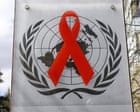
In our ever-evolving world, societies face significant shifts and challenges across various spheres. This article brings together a reflection on recent developments from global health to environmental policies and international trade, each with the potential to impact our daily lives and future.
One of the pressing issues today involves the plight of high-risk groups for HIV, who are experiencing increased criminalization globally. According to UNAids, recent legislative changes in several countries have begun reversing strides made over decades in the fight against HIV/AIDS. This shift particularly affects LGBTQ+ communities and individuals who inject drugs. These groups are now encountering more stringent legal restrictions, which could potentially stifle healthcare access and outreach, creating a barrier to effective treatment and prevention measures. As societies navigate these tight regulations, it remains critical to foster environments that encourage understanding and support for affected communities.
Meanwhile, environmental research is seeing its share of challenges. The discontinuation of almost $15 million in funding for studies into the impact of PFAS—often known as “forever chemicals”—on US agriculture by the Trump administration underscores concerns about food safety and ecological health. PFAS, prevalent in pesticides and sludge used on croplands, have been shown to permeate the ecosystem, affecting soil, crops, and water sources. While this funding cut may impede ongoing investigations, the broader conversation around sustainable agriculture and chemical safety continues, encouraging alternative solutions and collaborative efforts among researchers, policymakers, and communities.
On the international trade front, the United States, under the guidance of former President Trump, announced its intention to impose hefty tariffs on Canadian imports starting in August. These include a 35% levy on goods, complementing existing tariffs on auto parts, steel, and aluminum. The potential application of further tariffs on EU nations highlights a shifting landscape for international trade, prompting discussions on economic cooperation and competition. While such measures may seem daunting, they also provide an opportunity for countries to reassess trade practices and explore new avenues for economic resilience.
Lastly, attention is drawn to Nigeria, where environmental changes and human expansion pressure agricultural and pastoral lands, leading to increased conflicts. In central Nigeria, the growing competition for declining arable land has reportedly resulted in violent confrontations, exacerbating social tensions. Recognizing the roots of these conflicts rooted in climate change reinforces the urgency of adopting sustainable practices that balance human livelihoods and ecological health. Encouragingly, these challenges open pathways for dialogue, innovation, and the development of comprehensive strategies addressing both human needs and environmental stewardship.
As we delve into these multifaceted issues, it’s helpful to adopt a mindset that grounds us in a positive, forward-thinking approach. These global changes, while significant, can inspire cooperation, adaptation, and ultimately, progress toward inclusive and sustainable futures. Mindfulness in how we respond and engage in these topics underscores an important part of navigating the pathways ahead with empathy, resilience, and hope.
Source: {link}
